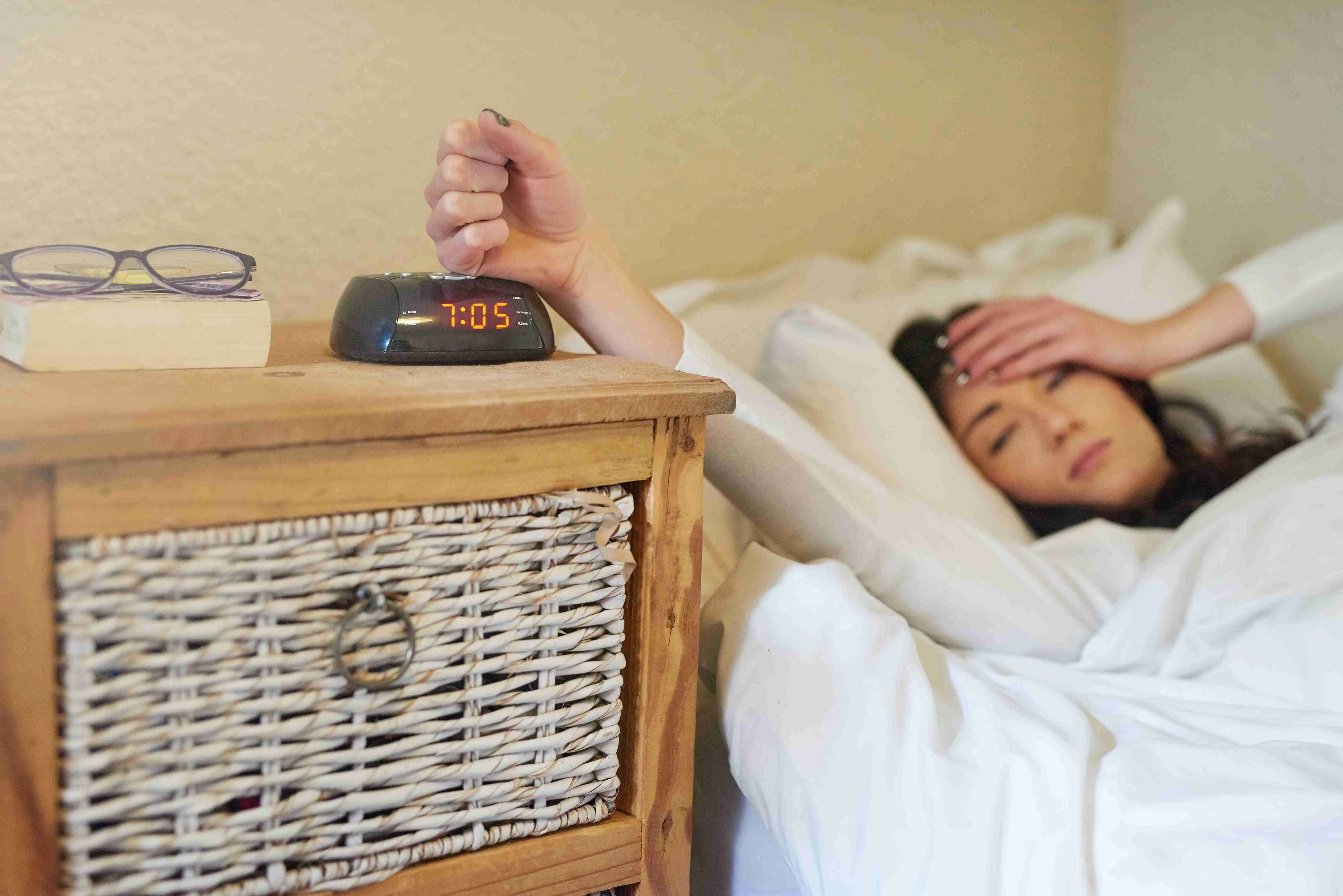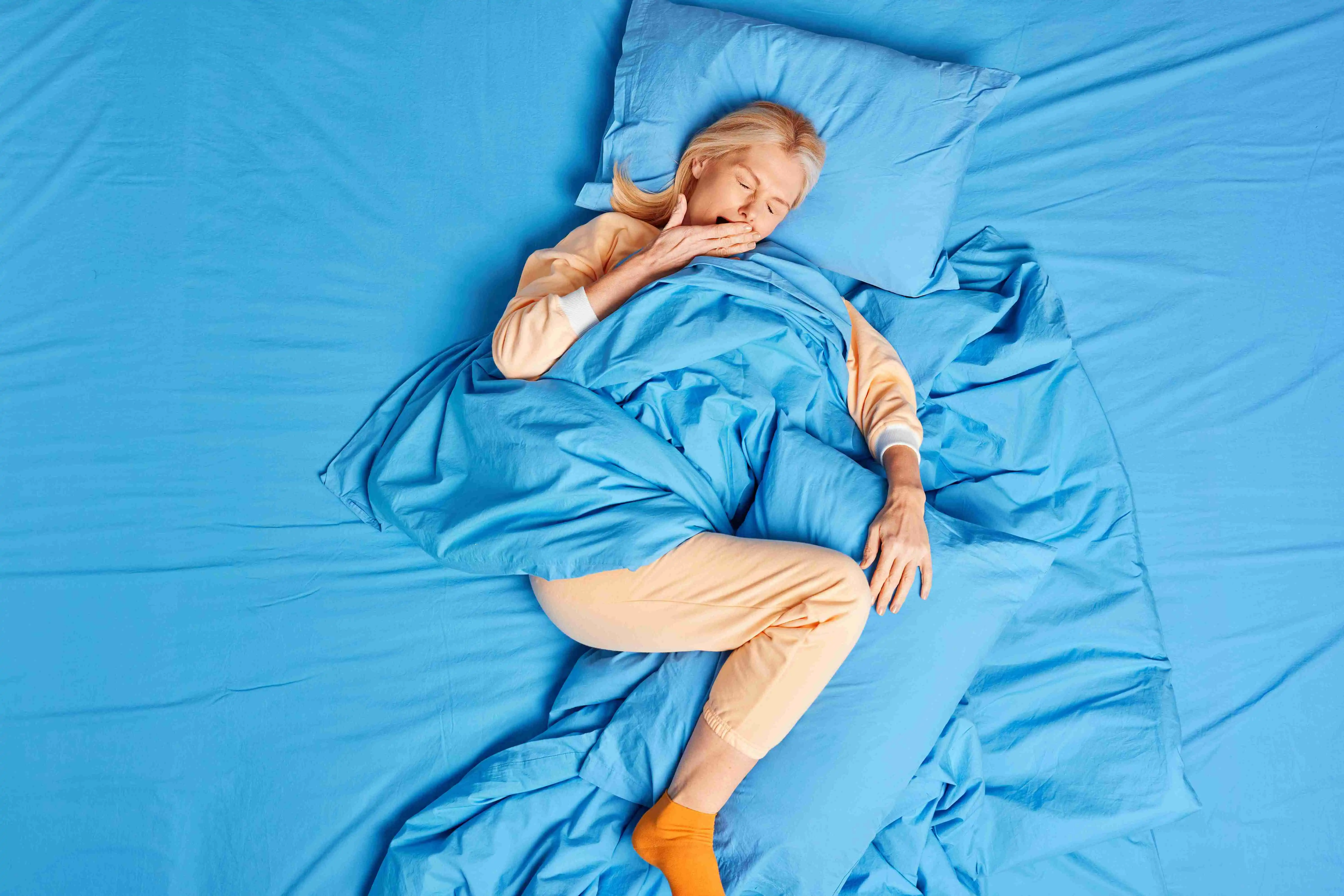Oversleeping, a phenomenon often associated with laziness or lack of discipline, is a common problem that affects individuals of all ages. Understanding how sleep works can help explain why some people need more sleep than others and how sleep duration impacts overall health.
While a good night's sleep is essential for overall health and well-being, excessive sleep can negatively affect productivity, mental health, and physical health.
In this article, we will explore the causes and effects of oversleeping, as well as strategies to overcome this habit and establish a healthier sleep routine.
What is Oversleeping?

Oversleeping, or hypersomnia refers to the act of sleeping for longer periods than what is considered normal or necessary for an individual's well-being.
While the amount of sleep needed can vary from person to person, oversleeping typically involves sleeping for more than 9-10 hours a night.
Symptoms of Oversleeping
While a good night's sleep is essential for our overall health and well-being, oversleeping can have adverse effects on our physical and mental health.
Daytime Fatigue
One of the most noticeable symptoms of oversleeping is daytime fatigue. Despite getting an adequate amount of sleep, individuals may still experience excessive sleepiness and find it difficult to stay awake during the day.
Lack of Energy and Motivation
Another symptom is a lack of energy and motivation, as oversleeping disrupts the natural sleep-wake cycle and leaves individuals feeling sluggish and unmotivated.
Mental Health Issues
Individuals who consistently oversleep are more likely to experience symptoms of depression and anxiety. These mental health conditions can further exacerbate daytime fatigue, making it even more challenging for individuals to function effectively throughout the day.
Additionally, oversleeping can have a negative impact on mood regulation, leading to irritability, low motivation, and a lack of interest in daily activities.
Difficulty Maintaining a Consistent Daily Routine
The symptoms of oversleeping, such as daytime fatigue and difficulty waking up in the morning can significantly impact one's ability to stick to a consistent daily routine, leading to difficulties in meeting deadlines, attending appointments, and maintaining regular activities.
Common Causes of Oversleeping

While occasional oversleeping may be a result of exhaustion or a well-deserved rest, chronic oversleeping can be indicative of an underlying health issue.
There are several common causes of oversleeping that can disrupt an individual's daily routine and overall productivity.
Sleep Disorders
- Sleep Apnea: Sleep apnea is a condition characterized by brief interruptions in breathing during sleep, leading to frequent awakenings and disrupted sleep patterns. These awakenings can result in daytime sleepiness and the need for extended periods of sleep to compensate for the lost rest.
- Narcolepsy: Narcolepsy is a neurological disorder that affects the brain's ability to regulate sleep-wake cycles. People with narcolepsy may experience excessive daytime sleepiness and uncontrollable episodes of falling asleep during the day, regardless of the amount of sleep they have had.
- Insomnia: Insomnia, a common sleep disorder, can also contribute to oversleeping. Insomnia is characterized by difficulty falling asleep or staying asleep, leading to fragmented and inadequate rest. As a result, individuals with insomnia may feel the need to oversleep to try to catch up on lost sleep.
Depression and Anxiety
People who are experiencing depression often struggle with disrupted sleep patterns, either sleeping too much or too little.
Oversleeping can be a way for individuals to escape from their negative thoughts and emotions temporarily.
Anxiety is another factor that can contribute to oversleeping. Anxiety can make it difficult for individuals to relax and fall asleep, leading to a cycle of sleep deprivation followed by excessive sleep to compensate for the lack of rest.
Both depression and anxiety can disrupt the body's natural sleep-wake cycle, resulting in oversleeping.
Poor Sleep Quality and Sleep Debt
One common cause is poor sleep quality. When someone doesn't get enough restful sleep during the night, their body may try to compensate by oversleeping.
This can be due to factors such as an uncomfortable sleep environment, excessive noise or light, or the presence of sleep disorders like insomnia or sleep apnea.
Another cause of oversleeping is sleep debt. Sleep debt occurs when someone consistently fails to get enough sleep over a while.
This can lead to a buildup of fatigue and a strong desire to sleep for longer periods to make up for the lost sleep.
Medications and Medical Conditions
Certain medications or medical conditions can also contribute to oversleeping. Some medications, such as sedatives or antihistamines, can cause drowsiness and prolonged sleep.
Medical conditions such as sleep apnea, narcolepsy, or thyroid disorders can disrupt the normal sleep-wake cycle and result in excessive daytime sleepiness and oversleeping.
It is important for individuals who are consistently oversleeping to consult with a healthcare professional to rule out any underlying medical conditions that may be contributing to their excessive sleep.
Neurological Conditions
Conditions such as idiopathic hypersomnia can contribute to oversleeping. These conditions disrupt the normal sleep-wake cycle and can result in excessive sleep durations.
It is important to consult a healthcare professional if you suspect a neurological condition may be causing your oversleeping, as proper diagnosis and treatment are essential for managing the condition effectively.
Lifestyle Factors
- Irregular Sleep Patterns: Many people have irregular sleep patterns due to shift work, jet lag, or staying up late on weekends. This can throw off the body's natural sleep-wake cycle, leading to excessive sleepiness and a desire to sleep longer.
- Lack of Physical Activity: Regular exercise helps regulate sleep patterns and promotes better quality sleep. When individuals lead sedentary lifestyles, their bodies may not receive the physical stimulation needed to maintain healthy sleep patterns, resulting in oversleeping.
- Stress: When people are stressed, their bodies produce higher levels of cortisol, a hormone associated with increased alertness. However, prolonged or chronic stress can lead to elevated cortisol levels even during sleep. This can disrupt the normal sleep cycle and cause individuals to oversleep in an attempt to compensate for the lack of restful sleep they are experiencing.
Excessive Alcohol or Drug Use
When individuals consume excessive amounts of alcohol or drugs, it can disrupt their sleep patterns and lead to prolonged periods of sleep.
Alcohol acts as a sedative, initially causing drowsiness and promoting sleep. However, it can also interfere with the quality of sleep and result in fragmented or restless sleep.
Similarly, certain drugs, such as sedatives or tranquilizers, can have a similar effect on sleep patterns.
These substances can alter the normal sleep-wake cycle, leading to excessive sleepiness and extended periods of sleep.
The Health Consequences of Oversleeping

Oversleeping, or getting more sleep than our bodies need, may seem like a luxury to some. However, it can have serious health consequences.
Increased Risk of Heart Disease
Individuals who consistently oversleep, typically defined as sleeping more than nine hours a night, are more likely to develop cardiovascular problems.
Therefore, it is important to maintain a healthy sleep routine and aim for the recommended seven to eight hours of sleep each night to reduce the risk of developing heart disease.
Obesity
Individuals who consistently sleep more than the recommended amount of 7-9 hours per night are at a higher risk of being overweight or obese.
This is believed to be due to imbalances in hormones that regulate appetite and metabolism.
Oversleeping can lead to increased hunger and cravings for unhealthy foods, leading to weight gain over time.
Diabetes
Individuals who sleep too much are more likely to have insulin resistance, a condition in which the body's cells do not respond properly to insulin.
Insulin resistance can eventually lead to the development of type 2 diabetes. Additionally, oversleeping has been associated with higher levels of fasting blood glucose and impaired glucose tolerance, both of which are risk factors for diabetes.
Cognitive Decline and Mental Fog
Excessive sleep can lead to a decrease in cognitive function, including memory and attention span.
This decline in cognitive abilities can have a long-term impact on overall mental performance and productivity.
Additionally, oversleeping can result in a mental fog, where individuals feel groggy and have difficulty concentrating throughout the day.
This can affect daily activities and tasks, leading to decreased efficiency and effectiveness.
Headaches
While it may seem counterintuitive, getting too much sleep can actually trigger headaches in some individuals.
Oversleeping disrupts the body's natural sleep-wake cycle, leading to changes in neurotransmitters and blood flow in the brain, which can contribute to headaches.
These headaches are often described as tension headaches and can be accompanied by other symptoms such as neck pain and sensitivity to light or sound.
Fatigue and Low Energy
Despite getting more sleep than necessary, individuals who oversleep often wake up feeling groggy and unrefreshed. This can be attributed to disruptions in the sleep cycle, as well as decreased physical activity during extended periods of sleep.
Additionally, oversleeping can throw off the body's internal clock, making it difficult to maintain consistent energy levels throughout the day.
Weakened Immune System
When we oversleep, our body's natural defense mechanisms become compromised, leaving us more susceptible to infections and illnesses.
This is because oversleeping disrupts the balance of our immune system, making it less efficient in fighting off bacteria and viruses. As a result, individuals who consistently oversleep may find themselves falling ill more frequently and taking longer to recover.
Shortened Lifespan
It is believed that oversleeping may contribute to the development of chronic diseases such as obesity, diabetes, and cardiovascular problems.
Additionally, excessive sleep can lead to a sedentary lifestyle, as individuals who spend more time sleeping are likely to spend less time engaging in physical activity.
This lack of exercise can further increase the risk of developing health conditions that can shorten one's lifespan.
How much sleep do you need?
The amount of sleep a person needs varies depending on different factors, including age, as people of different ages require different amounts of sleep.
| Age | Daily Sleep Recommendations |
|---|---|
| Infants | 12-16 hours (including naps) |
| Toddlers | 11-14 hours (including naps) |
| Preschool-age children | 10-13 hours (including naps) |
| School-age children | 9-12 hours |
| Teens | 8-10 hours |
| Adults | 7 hours or more |
Tips to Stop Oversleeping
By implementing some tips, you can take control of your sleep patterns and prevent oversleeping, which in turn will not only improve the quality of your sleep, but it will also improve the quality of every aspect of your life.
Set a Consistent Sleep Schedule
One of the most effective ways to stop oversleeping is to set a consistent sleep schedule.
This means going to bed and waking up at the same time every day, even on weekends.
By sticking to a regular sleep routine, your body will become accustomed to a specific sleep pattern, making it easier to wake up in the morning and avoid oversleeping.
Use an Alarm Clock Wisely
Set your alarm for a consistent time each day and place it across the room from your bed.
This will force you to physically get out of bed to turn it off, making it harder to hit the snooze button and go back to sleep.
Additionally, consider using an alarm clock with features such as a gradual wake-up light or soothing sounds that can gently rouse you from sleep, making the waking-up process more pleasant.
Create a Morning Routine
Another helpful tip to prevent oversleeping is to create a morning routine. Establishing a consistent routine can signal to your body and mind that it's time to wake up and start the day.
You can also include some physical activity during the morning hours, such as walking, followed by eating a healthy and nutritious breakfast.
This will help regulate your body's internal clock and make waking up easier over time.
Limit Caffeine
It is important to limit caffeine intake, especially in the afternoon and evening. Caffeine is a stimulant that can interfere with your sleep quality and make it harder to fall asleep at night.
By reducing your caffeine consumption, you can ensure that your body is able to relax and prepare for a restful night's sleep.
Reduce Screen Time Before Bed
The blue light emitted by electronic devices can interfere with your sleep patterns, making it harder to fall asleep and stay asleep.
Try to avoid using your phone, tablet, or computer for at least an hour before bedtime. Instead, engage in relaxing activities like reading a book or taking a warm bath to help prepare your body for sleep.
Stay Active During the Day
Engaging in regular physical activity not only helps to tire your body out, but it also releases endorphins that can improve your overall mood and energy levels.
By incorporating activities such as walking, jogging, or cycling into your daily routine, you can ensure that your body gets the exercise it needs to promote a healthy sleep schedule.
Expose Yourself to Natural Light
Natural light has been proven to help regulate our circadian rhythm, which is our body's internal clock that controls our sleep-wake cycle.
By spending time outside during the day or opening up your curtains to let sunlight in, you can signal to your body that it is daytime and help reset your internal clock.
This can ultimately lead to a more restful and balanced sleep at night.
Eat a Healthy Diet
A well-balanced diet can have a significant impact on your sleep patterns.
Avoid consuming heavy meals or foods high in sugar and caffeine close to bedtime, as these can interfere with your ability to fall asleep and stay asleep.
Instead, opt for lighter meals that include lean proteins, whole grains, and plenty of fruits and vegetables.
These foods contain nutrients that promote better sleep and allow you to wake up feeling more refreshed.
Check for Underlying Health Issues
If you find yourself constantly oversleeping and struggling to wake up on time, it may be worth checking for any underlying health issues.
Sometimes, oversleeping can be a symptom of certain medical conditions such as sleep apnea or thyroid problems.
Consulting with a healthcare professional can help identify and address any potential health concerns that may be contributing to your excessive sleepiness.
They may suggest undergoing a sleep study or running other tests to rule out any underlying issues.
By addressing these health problems, you can take a step towards improving your sleep quality and reducing the tendency to oversleep.
FAQs
How is oversleeping diagnosed?
One of the primary methods used by healthcare professionals is the collection of sleep diaries or logs, which record the individual's sleep duration and quality over a specific period.
Is 12 hours of sleep considered oversleeping?
The recommended amount of sleep for adults is typically around 7-9 hours per night. Therefore, sleeping for 12 hours may be considered excessive and could indicate a potential sleep disorder or underlying health issue.
What to do when oversleeping?
Setting a consistent sleep schedule is crucial. Going to bed and waking up at the same time every day helps regulate the body's internal clock.
Can mental health issues cause oversleeping?
Mental health issues can indeed cause oversleeping in individuals. Conditions such as depression, anxiety, and post-traumatic stress disorder (PTSD) can disrupt a person's sleep patterns, leading to excessive sleepiness.
Conclusion
Oversleeping is a habit that can disrupt our daily lives and have detrimental effects on our physical and mental well-being.
By understanding the causes and effects of oversleeping and implementing strategies to establish a healthy sleep routine, we can effectively manage this issue.
It is important to prioritize quality sleep over excessive sleep and strive for a balanced lifestyle that allows for optimal rest and productivity.
Moderation is key when it comes to sleep, and finding the right balance will lead to improved overall health and wellness.
Dom Abraham
As the lead content writer at Sleepiverse. Dom pours his heart into writing mattress reviews, bedding product reviews, and medically-reviewed health articles. Dom is from Portugal and likes to spend his free time writing on the beach as it gives him a sense of comfort. Aside from writing mattress reviews in front of the soothing beach view, Dom likes to experiment with new amazing food ideas.


